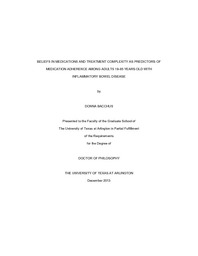| dc.description.abstract | Low adherence to medications in patients with inflammatory bowel disease (IBD) results in relapses and subsequently increased healthcare costs, poor quality of life, and increased comorbidities. In this correlational study, treatment complexity and beliefs in medications were tested to determine if they are predictors of medication adherence. Through convenience sampling, participants were recruited through face book, IBD organizations, and foundation websites (n = 369 final sample size). Females comprised the overwhelming majority (81.8%) of the sample. Using the Morisky Medication Adherence Scale, approximately 56% were classified as nonadherent and 44% as adherent. Beliefs in medications were measured by four subscales: necessity, concerns, harm, and overuse. Treatment complexity was measured by a researcher-developed 5-item scale. The odds ratio for treatment complexity was .824 (95% CI = .768 - .884), p < .05, less than one, indicating that for every unit increase in treatment complexity, respondents were 18% less likely to be adherent (Pallant, 2009). The strongest predictor of adherence was specific necessity beliefs, 1.102 (95% CI = 1.062 - 1.143), p < .05, indicating that for every unit increase in beliefs in the necessity of medications, respondents were 11% more likely to be adherent (Pallant, 2009). Overall, demographic factors were not associated with adherence rates, but use of biologics and 5-ASA compounds, reports of depression and obesity, and intravenous method of medication administration were all significantly associated with adherence. Findings in this study were not dissimilar from those of previous studies in which conflicting results were found for some demographic variables and some consistencies for illness and treatment variables. Adherence rates can be improved when healthcare providers discuss beliefs in medications and treatment complexity problems with patients. This alliance can only result in clarification, education, and reinforcement of the importance of medication adherence: Ultimately, patients will have improved medication adherence. | en_US |


